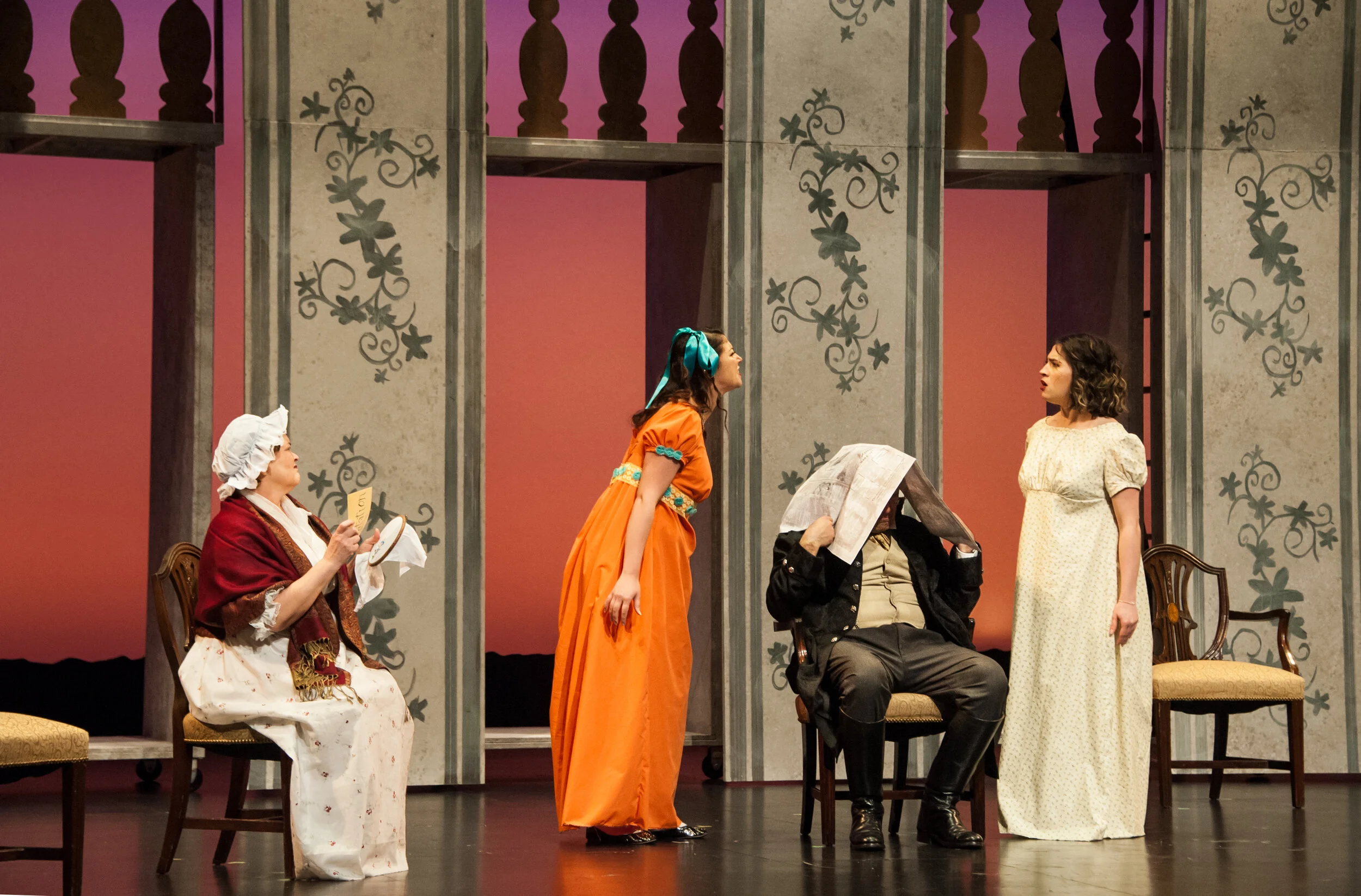In Which Elizabeth Bennet Plays the Air Piano
Photo credit: Linda Blase
It is a truth universally acknowledged that no production of Pride and Prejudice will be in want of an adoring audience, and opening night of Shakespeare Dallas’s 49th season and second winter production was no exception.
My introduction to the now-timeless love story between Elizabeth and Darcy came when I was 12. I sped through Austen’s delightfully witty novel and quickly swallowed the others, unable to get enough of the Regency era antics that seem both so distant and so familiar to modern audiences. The staggering number of productions, literary spin-offs, and retellings across various artistic genres surely makes it a daunting task for any theater to approach the script.
To appropriately balance the weight of audience expectations with the need to make new artistic choices than those who have come before is no small feat. Under the expert direction of Christie Vela, Shakespeare Dallas’s mashup veteran-and-debut cast and crew largely found their space. 80’s anthems were successfully paired with elaborate Regency style dances under stark, modern lighting, bending the rules of the period just enough to add flair. When Mr. Darcy (Chase Bradshaw) carefully and earnestly approached Elizabeth (Francine Gonzalez) during her visit, the lilting sounds of Brahms’ Opus 118 No. 2 for the piano played, helping to foster a particularly lovely moment of tenderness between the two. Gaps or missing pieces in the set served to direct attention back to the actors, as when both Elizabeth and Caroline Bingley (Joan Milburn) charmingly played the air piano instead of a real set piece. Though the set was not elaborate except for the commanding false proscenium walls covered in Austen’s text, it more than did its job to draw me into the action of the story.
In any Regency piece, it’s paramount for the actors to successfully translate the subtle, tight, wit of the period in their performance. They must be able to communicate awkwardness, subtlety, and most of all chemistry while still making their existence within a tightly restricted social class believable. It’s a significant leap to go from being a modern woman to a Regency woman, and it’s one that Francine Gonzalez as Elizabeth struggled to make. Instead of a witty Elizabeth who simmered under the restrictions of the period, bending and pressing at the seams of conversation just as far as she was able to without being scandalous, we saw plainly an angry Elizabeth. This anger-forward interpretation of the character made it difficult to locate the essential chemistry between her and Mr. Darcy (Chase Bradshaw) and caused Darcy’s reluctant proposal at the end of act one to feel rather more awkward than heartbreaking. Though the couple had some successful moments together, much better than their interactions with each other were their interactions with their partner characters, Bingley and Jane. In those softer, more familial moments, Darcy and Elizabeth shined.
People forget that Pride and Prejudice is about more than just Elizabeth and Darcy’s romance, but I never did in this show. Ben Stegmeir presented a startlingly different, and exceptionally endearing, version of Mr. Bingley who I will surely miss in every subsequent production I see. Opposite Celeste Perez’s soft-but-strong Jane, their adorably awkward chemistry was lovely to witness.
I laughed and laughed over Lulu Ward’s delightful Mrs. Bennet. No matter what “fit of the vapors” she was exclaiming over, Ward could be heard and understood and never failed to elicit a reaction from the crowd. Mr. Collins (Jeremiah Johnson) comedically commanded the stage as well, producing laughter at times from as little as a sideways glance or a tight, painfully-earnest nod. Both characters were a joy to watch throughout the show.
Caroline Bingley (Joan Milburn) gave a strong showing of the classic, uppity Regency woman, so much so that when she transitioned to her role as Mrs. Gardiner it was difficult as an audience member to process the character switch. Combining this with the choice to cast Johnson as both the singular Mr. Collins and Mr. Gardiner made it difficult to believe fully in the appearance of this couple in the second half of the show. Kristen Lazarchick as both Charlotte Lucas and the servant did not suffer from this problem, which may be a function of the class/costuming difference between the two characters she played. Not to say it isn’t also a function of Lazarchick’s exceptional talent—any actor who can bring Charlotte Lucas to life as a memorable and distinct character is doing something right.
Lydia (Tatiana Gantt) was every bit as effusive and energetic as she needed to be, providing a stark counterpoint to Mr. Wickham’s (Evan Michael Woods) rather stoic affect. Anthony L. Ramirez gave a strong showing as the patriarch of the Bennet family. Kitty (Kat Lozano) and Mary (Marisa Duran) filled out the energetic residents of the Longbourn estate, rendering classic and strong depictions of these lively supporting characters.
Left to mention is the inimitable T.A. Taylor as Lady Catherine de Bourgh. I had no complaints, as usual, about his exceptionally strong delivery, but in a production so centered around diversity as to choose a Latinx cast for the Bennet family, it makes little sense to me why Vela chose a man to play Lady Catherine. For a company that has precious few chances to cast older women in powerful roles, I simply feel that this was a missed opportunity.
All in all, this was an excellent show, and I’m truly looking forward to seeing it a second time next weekend. Don’t miss your chance to see this lovely retelling of a beloved, classic story. Shakespeare Dallas’s Pride and Prejudice runs January 10-19, 2020 at Moody Performance Hall.
A disclaimer: This critic has tried her best during the writing of this review to set aside all biases related to her brother Jeremiah Johnson’s presence in this show.
Photo credit: Linda Blase



